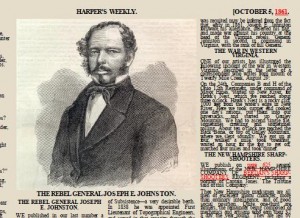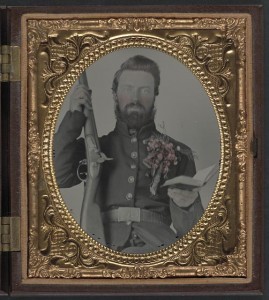The Bohemian correspondent for the Richmond Daily Dispatch will apparently no longer be reporting on the Confederate Army of the Potomac under General Joseph E. Johnston. As Bohemian says his goodbyes he offers his readers a poem about highly idealized war.
From the Richmond Daily Dispatch January 6, 1861:
Monday morning…Jan. 6. 1862.
Army of the Potomac.
[our own correspondent.]
Richmond, Jan. 3, 1862.
Auphora capita Latini; Charente rote our emcee exit
Horac[e].
Some days ago I published information regarding the winter quarters of our army, based upon the statement of a gentleman whom I supposed correctly informed upon all points connected with the disposition of troops, but I have since learned from better authority that my publication was premature, and furthermore, that it was substantially incorrect. Ten thousand rumors upon the subject are floating on the current of public talk; but they are merely exaggerated reports upon a matter no one beyond our Generals can even predicates an opinion. In my college days I recollect to have read, I think in Terrence, the saying, “Insita lomixibus libide sleadi de industria rumores”–men have in them a natural propensity for spreading rumors.
The truth of the phrase was never more apparent than at present. Men take very diminutive facts, blow them up into unusual dimensions, then set them afloat,–as school-boys inflates bladders, and use them for footballs. …
I have written all these moral reflections over the fact that I was misled, after leaving Centreville, into the statement that our army had gone into winter quarters. Speaking collectively, exactly the riverside is true. A portion of the troops have been assigned more favorable positions, but only a small portion are now engaged in the “hutting” process. Although the present prospect is quiet enough, no one can say what the winter will bring forth — whether it will be quietly spent in camp, or whether a more active policy will be inaugurated. At present winter exists only in name, but we have precedents upon which to found an opinion that there may be had weather before spring Good, comfortable quarters must be provided for our volunteers during the chilly storms of winter. No matter what course may be pursued in the conduct of the war — act on the defensive or offensive — the health and comfort of the men demand that proper shelter should be given them.
If General Johnston has decided to assume the aggressive, there is no reason in the world why the men should not be allowed the privilege of making log huts to live in until he is ready to lead them into the field….
In the army of the Confederate States at the present moment, there is enrolled an amount of intelligence, conscientious conviction, earnestness of deliberate will consecrated to a holy cause, never, perhaps equalled in the history of eighteen centuries. The best blood, and the truest, most manly hearts of our Southern land, are enlisted in the defence of its honor. When we think of the chivalric noble men composing the rank and file of our army, how closely do we scan the character of the General upon whom the responsibility of their treatment rests. God forgive the commander who neglects and misuses such men while in the field! …
Like hundreds of others, I, too, can have dreams. Pardon my introducing one here.
The student’s dream.
My dreams are all of battle scene,
And through the silent night,
There breaks upon my slumbering [e]ars
The stilling sound of charging cheers
The tumult of the fight.
The [a]ir is full of waving swords–
Around my couch of sleep.
I see the polished helmets flash;
I hear the round shield’s ringing crash.
And the war cry’s made deep.
Sounds of the night I [?] they wake me not;
Yet off in dreams I rise,
A[n]d, girded with a monarch’s power,
I lead those heroes of an hour
Against a foe that flies.
I wear a crown of glory then.
And priceless diamonds gleam
On hilt and cross of that keen steel
My griping fingers thrill to feel
In the right hand of my dream.
Wildly and him the visions fade–
I mourn with waking day
To leave the throbs and thrill of strife,
To wake in dull and deedless life,
To join a world at play.
My spirit loathes its midday dream,
And curses hot are poured,
To don a tattered crown or weeds.
A schoolboy’s forge of plaited reeds,
A jester’s wooden sword:
There are many facts connected with the management and mismanagement of the army which I have yet to write, but for the present they must remain in my note-book. Perhaps it would be better. if they were left there altogether, but there are circumstances which remove the stamp of secrecy from many things yet untold, that as a public chronicler of daily events, I ought to give the people, but which have been withheld for prudential reasons.
Kind friends, good-bye!
Bohemian.



Pingback: Snow March: “indifferently supplied with shoes” | Blue Gray Review